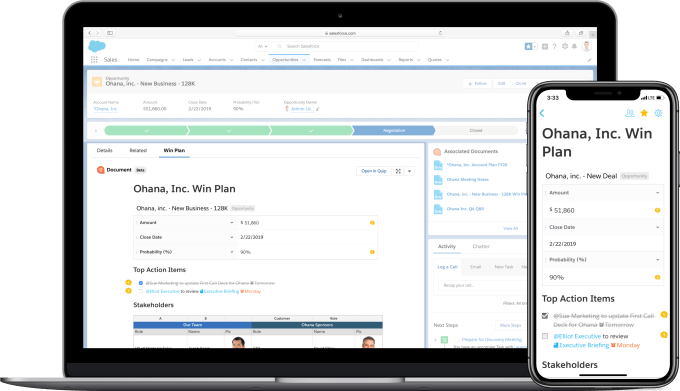When Salesforce bought Quip in 2016 for $750 million, it was fair to wonder what it planned to do with it. While company founder Bret Taylor has moved up the ladder to Chief Product Officer, Quip remained a stand-alone product. Today that changed when the company announced it was embedding Quip directly into its sales and customer service clouds.
Quip is a collaboration tool with built-in office suite functionality including word processing, spreadsheet and presentation software. As a stand-alone product, it enables teams to collaborate around a rich set of documents. Quip for Salesforce is embedding that kind of functionality at the platform level.
Alan Lepofsky, who recently joined Salesforce as VP of Salesforce Quip, says the announcement is the culmination of a desire to embed the tool into into Salesforce. “By bringing productivity directly into the context of business workflows, sales and customer support teams can collaborate in brand new ways, enabling them to be better aligned and more efficient, ultimately providing a better customer experience,” Lepofsky told TechCrunch.
Quip appears as a tab in the Sales or Service Cloud interface. There, employees can collaborate on documents and maintain all of their information in a single place without switching between multiple applications or losing context, an increasingly important goal for collaboration tools including Slack.

Photo: Salesforce
Administrators can build templates to quickly facilitate team building. The templates enable you to start a page pre-populated with information about a specific account or set of accounts. You can take this a step further by creating templates with a set of filters to refine each one to meet the needs of a particular team, based on factors like deal size, industry or location.
In the service context, customer service agents can set up pages to discuss different kinds of issues or problems and work together to get answers quickly, even while chatting with a customer.
Salesforce has various partnerships with Microsoft, Dropbox, Google, Slack and others that provide a similar kind of functionality, and those customers that want to continue using those tools can do that, but 2.5 years after the Quip acquisition, Salesforce is finally putting it to work as a native productivity and collaboration tool.
“As an industry analyst, I spent years advising vendors on the importance of purpose and context as two key drivers for getting work done. Salesforce is delivering both by bringing productivity from Quip directly to CRM and customer service,” Lepofsky said.
The idea of providing a single place to collaborate without task switching is certainly attractive, but it remains to be seen if customers will warm to the idea of using Quip instead of one of the other tools that are out there. In the mean time, Quip will still be sold as a stand-alone tool.
No comments:
Post a Comment